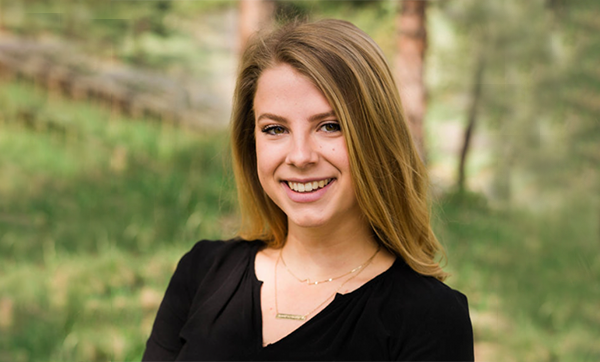Student Studies Impact of Extreme Weather on Health.

Student Studies Impact of Extreme Weather on Health
Quinn Adams, a doctoral student in the Department of Environmental Health, is studying the health risks of extreme weather and the impact of climate change on infectious diseases.
Growing up in Boulder, Colo., Quinn Adams (SPH’21) was always very aware of the environment around her. She spent most of her childhood outdoors, and when she wasn’t hiking, biking, or skiing, she was talking about climate change with her parents and other climate activists in her neighborhood.

“When you spend so much time outdoors, you get really attached to issues surrounding climate and environmental change,” she says. “They are always top of mind.”
As an undergraduate student at the University of Colorado Boulder, Adams began studying environmental health and atmospheric sciences, and started to gain a better understanding of the influence that the environment and climate change can have on health. After graduating, she began working with the National Caucus of Environmental Legislators in Washington D.C., where she worked directly with legislators on shaping environmental health policies through a social justice lens and translating current climate science into these policies.
In 2020, Adams came to the School of Public Health for her Master of Science degree in Climate and Health through the Population Health Research program, and is now pursuing her PhD in environmental health at SPH, with a major in environmental epidemiology and minors in biostatistics and infectious disease. She is also in the BU Graduate Program in Urban Biogeoscience and Environmental Health (URBAN).
During her first semester at SPH in the Fall of 2020, Adams worked with other faculty and students on a white paper that was sent to the incoming Biden-Harris administration, urging them to focus their new climate policies on environmental justice and health equity.
“The future of the climate and health field is really reliant on people from other fields working together,” says Adams. “Working on this paper was a great experience because we were not looking at science and policy as two separate things, and were instead thinking about how we can bridge this gap and bring the two fields together to support population health.”
Throughout her time at SPH, Adams has also been involved in several research projects, working primarily with Gregory Wellenius, professor of environmental health and director of the Climate and Health program. Much of this work has focused on studying the impact of extreme heat on health, especially among vulnerable populations. One such project uses Google Health Trends data as an innovative data source for better understanding how heat influences health and people’s behaviors toward heat.
As she dives deeper into her PhD work, Adams says she hopes to shift her focus a bit and begin studying the health risks of other forms of extreme weather, including drought, rainfall, flooding, and hurricanes, as well as the impact of climate change on the distribution of infectious diseases over time.
“The great thing about the climate and health field is that it is so diverse, and you can really explore your interests, no matter how varied they may be” she says. “It’s not only about epidemiology or atmospheric sciences; it’s city planning and government and all of these different pieces that intersect and weave together to protect the people living all around the world. There is a lot of room to be innovative and interdisciplinary, and it’s really exciting.”
It is this interdisciplinary-nature of the field that drew Adams to SPH to begin with. She hopes to take advantage of the opportunities to collaborate with other researchers from across the Boston University campus through the URBAN program, as well as with those outside of the academic space who are tackling issues around climate change and environmental justice from different angles.
“Understanding how to work with people from various fields and learning more about how different fields intersect and connect is a really important piece of our education,” she says. “We are getting to a point where people are thinking about climate change more than ever before, so we need to build these partnerships so we can begin to make effective change.
“Climate and health is very up-and-coming, so it feels really good to be growing in the field and doing this work at SPH, where people are just as eager and enthusiastic about it as I am.”